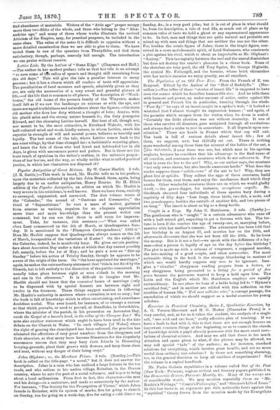Popular Antiquities of Great Britain. By W. Carew Hazlitt. 3
vols. (J. R. Smith.)—This work is based, Mr. Hazlitt tells us in his preface, upon the materials collected by the late John Brand, these, again, being largely due to an earlier antiquarian, Henry Bourne. Sir H. Ellis's edition of the Popular Antiquities, an edition on which Mr. Hazlitt is very severe in his criticisms, is well known. Here we have them, entirely re-arranged, augmented, and corrected. The first volume treats of the "Calendar," the second of " Customs and Ceremonies," the third. of " Superstitions." So vast a mass of matter, gathered from sources so various, requires for an adequate appreciation more time and more knowledge than the present writer can command, but he can see that there is still room for improve-
ment. Take, for instance, this sentence :—" What was called clean Lent commenced on the 5th of March, or Quadragesima Sun- ' day. It is mentioned in the ' Plumpton Correspondence,' 1502-3." Does Mr. Hazlitt suppose that Quadragesima always comes on the 5th of March, irrespective of the variations of Easter? On tho subject of the Calendar, indeed, he is manifestly hazy. He gives certain particu- lars about Ascension Day under a date at which that day cannot possibly fall, namely, before the 1st of May; and he puts a note on " Stir-up Sunday" before his notice of Trinity Sunday, though he appears to be aware of the origin of the term. On "the hour appointed for marriages," again, he makes the extraordinary statement that "this is not fixed by the Church, but is left entirely to the discretion of the parties concerned. It usually takes place between eight or nine o'clock in the morning and one in the afternoon." It is difficult to imagine that Mr. Hazlitt should not know that the canonical hours of marriage (only to be dispensed with by special licence) are between eight and twelve in the forenoon. These things suggest caution in following Mr. Hazlitt's authority in matters where correction is not so easy; but the book is full of knowledge which is often entertaining, and sometimes doubtless useful. Who ever heard, for instance, of so strange a custom as that which prevails, or used to prevail, at Standlake, in Oxfordshire, where the minister of the pariah, in his procession on Ascension Day, reads the Gospel at a barrel's head, in the cellar of the Checquer Inn? We note also another statement which ought to have been used in the late debate on the Church in Wales. "In such villages [of Wales] whore the right of grazing the churchyard has been enforced, the practice has alienated the affections of very great numbers from the clergymen and their churches, so that many have become Dissenters for the singularly uncommon reason that they may bury their friends in Dissenting burying-grounds, plant their graves with flowers, and keep them clean and neat, without any danger of their being crept."




























 Previous page
Previous page